|
|
|
Sort Order |
|
|
|
Items / Page
|
|
|
|
|
|
|
| Srl | Item |
| 1 |
ID:
189401


|
|
|
|
|
| Summary/Abstract |
Augustine weapons systems are proposed as a new class of investment good. They have distinctive economic characteristics (technology intensive, high and rising unit costs, and declining volumes) leading to extensive changes in armed forces’ arsenals including the progressive replacement of military bulk with ever-smaller volumes of increasingly complex, capable, but also expensive weapons systems. While much has been written about their costs, there remain gaps in our understanding of their investment rationale and the modus operandi of their procurement. We distinguish between incremental and transformative Augustine weapons systems and discuss their investment rationale. We show that further understanding of Augustine weapons systems is obtained by using Lancaster’s model of product characteristics and the real investment options framework. Some civilian parallels are also discussed.
|
|
|
|
|
|
|
|
|
|
|
|
|
|
|
|
| 2 |
ID:
189400
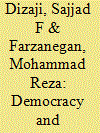

|
|
|
|
|
| Summary/Abstract |
This study examines the dynamic relationship between democracy and the military in more than 40 developing countries from 1990 to 2017. We investigate the dynamic interaction between democracy and military institutions using a panel vector autoregressive model and impulse response functions as well as variance decomposition analyses. We show that democracy plays a significant role in the substitution of nonmilitary expenditures for defense expenditures. We also investigate the response of democracy to positive shocks in military and nonmilitary expenditures. We find that the responses of political systems and different indexes of democracy including electoral, liberal, participatory, deliberative, and egalitarian democracy to positive shocks in military expenditures are negative and significant, whereas their responses to the shocks in nonmilitary expenditures are not significant. This result suggests that the political behavior of governments in developing countries is influenced more heavily by their spending on the military sector than by their spending on the nonmilitary sector.
|
|
|
|
|
|
|
|
|
|
|
|
|
|
|
|
| 3 |
ID:
189402


|
|
|
|
|
| Summary/Abstract |
This study uses a nonparametric causality-in-quantiles approach to investigate the causal relationship between the gold market and geopolitical risks from 4 January 2000, to 17 November 2017, using high-frequency data. The results indicated that geopolitical risks affect volatility rather than returns in the gold market. We also decompose intraday volatility into continuous and discontinuous jump components and find that geopolitical risks have stronger causality with the jump component under bear and normal market conditions. The results show, moreover, that the effects of geopolitical risks on realized volatility are asymmetric. Lastly, we divide the entire sample into four major geopolitical events (i.e. the 9/11 terrorist attacks, Irap invasion, the Russia-Ukraine crisis, and Paris attacks) and find that the effect of these events on the gold market varied by type and scope.
|
|
|
|
|
|
|
|
|
|
|
|
|
|
|
|
| 4 |
ID:
189403
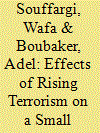

|
|
|
|
|
| Summary/Abstract |
The purpose of this paper is to shed light on the impact of the rising terrorist threat on the performance of a small capitalization market – the Tunisian stock market-. Using an event study methodology as well as conditional volatility, we investigate the impact of recent terrorist attacks in Tunisia on the general index TUNINDEX and sector indices. Our main findings are as follows. First, we find that terrorist attacks negatively affect the Tunisian stock market. However, the decline – considerable in certain cases- is short-lived: the market recovers from terrorist shocks in one day. Second, Oil and Gas, Insurance and Telecommunications, are the most affected sectors. Third, different terrorist tactics have varied effects on the stock market that leads us to conclude that attack type, weapon type, target type, and severity of the attack may determine the market’s reactions.
|
|
|
|
|
|
|
|
|
|
|
|
|
|
|
|
| 5 |
ID:
189405
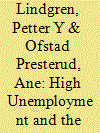

|
|
|
|
|
| Summary/Abstract |
The SARS-CoV-2 pandemic, the subsequent non-pharmaceutical interventions by governments to reduce the transmission of the coronavirus, and adjusted consumer behaviors have resulted in high unemployment rates worldwide. In this paper, we explore whether the Norwegian Armed Forces can exploit this period of high unemployment to strengthen security and defense in Norway while increasing the job opportunities for young individuals in a difficult labor market. Before the pandemic, the Norwegian government had planned to gradually increase the number of personnel in the armed forces. Hence, an expedited recruitment strategy may improve welfare. We calculate the costs and benefits to Norwegian society of a strategy that exploits the hike in unemployment rates to recruit new personnel to the armed forces at a faster rate. We find that the expedited recruitment strategy will likely provide net benefits to society if the unemployed have a fair chance of being employed. However, we stress that there must be a real need for higher defense spending, it is difficult to estimate the economic value of defense production, and there may be a trade-off between the goals of labor market policies and those of defense policies.
|
|
|
|
|
|
|
|
|
|
|
|
|
|
|
|
| 6 |
ID:
189399
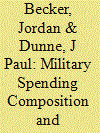

|
|
|
|
|
| Summary/Abstract |
In the large literature on military spending and growth, the heterogeneity of the categories of expenditure is seldom considered. Military spending is used to pay for a variety of things, including salaries, large weapon systems, and physical infrastructure, along with ongoing operations, training, and readiness - each of which might be expected to have different implications for economic growth. One reason for the focus on aggregate spending is the lack of disaggregated cross-country data, but there are some data available from NATO and the EU that break military spending into personnel, equipment, infrastructure and other expenditures (primarily operations and maintenance). This paper uses these data, available for 34 countries, for as many as 49 years, to investigate whether the composition of military budgets affects economic growth. Estimating standard growth models with this data it finds that as expected there is considerable heterogeneity in the effects of the different components. Specifically, the negative correlation between military spending and growth found in recent studies is primarily driven by personnel expenditures, and - slightly less clearly - by operating expenditures.
|
|
|
|
|
|
|
|
|
|
|
|
|
|
|
|
| 7 |
ID:
189404
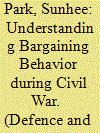

|
|
|
|
|
| Summary/Abstract |
This paper provides a new approach to studying the behavior of groups engaged in civil war termination bargaining by focusing on the commitment problem. Extending the basic Rubinstein bargaining model, the model presented here has the added feature of a reneging option for the stronger group after an agreement is reached. This leads to the prediction that when groups expect the absence of an enforcement mechanism, the stronger group makes a larger concession, while the weaker group makes a more demanding offer, than would be expected according to the relative power dynamic between groups. On the other hand, when groups expect that a third-party peace operator will enforce an agreement, groups’ offers more closely reflect their relative power situation. To illustrate the causal process of groups’ bargaining behavior, five bargaining attempts during Sierra Leone’s civil wars from 1991 to 2002 are examined.
|
|
|
|
|
|
|
|
|
|
|
|
|
|
|
|
|
|
|
|
|